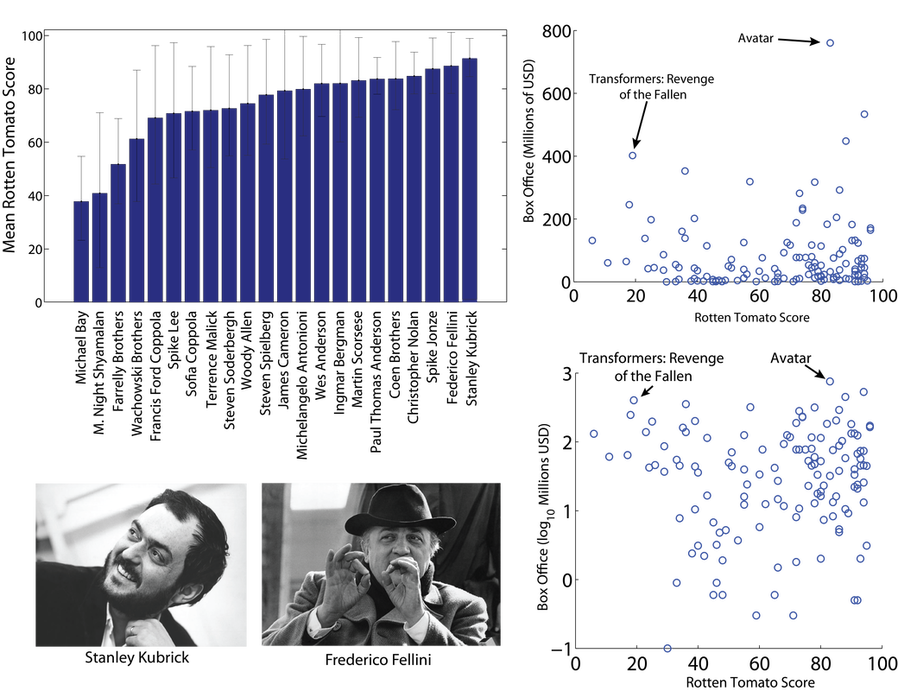A BIG DIRECTOR TOMATO FIGHT
I thought it would be neat to see some of the most famous directors face off by comparing Rotten Tomatoes scores. Sure, there is a lot more necessary to consider when comparing directors, but Rotten Tomato scores are real numbers and they are easy to collect quickly. I opted to use the critic score, not the audience one.
I created a Matlab program that gets data from the Rotten Tomatoes website by typing in a director's name. The code then plots scores over time. I asked my fellow labmates: "What directors would you want to face off in a battle? A contest comparing their careers in film." I got great feedback. Shown below are some of my favorite Rotten Tomato battles.
I created a Matlab program that gets data from the Rotten Tomatoes website by typing in a director's name. The code then plots scores over time. I asked my fellow labmates: "What directors would you want to face off in a battle? A contest comparing their careers in film." I got great feedback. Shown below are some of my favorite Rotten Tomato battles.
In many cases, you can see there is huge amount of variability in Rotten Tomato scores for some of the directors. Is this a reflection of inconsistent movie quality or is it just the variability of Tomato scores? The thing is that each Rotten Tomato score is an average score from a lot of critics, so we can be pretty confident in its value. A concerning issue in this type of comparison is the differences in the number of movies made by each director. Is it fair to compare Kubrick (who directed 13 movies) to Bergman (36 movies)? Actually there is a lot of mathematical danger in doing this! Next idea bubble will be all about this.
But for now, let's just run with it. Let's compare the average Rotten Tomato score across all these directors plus a few others (shown below to the left). Also included is the standard deviation of each director scores. I am not saying Kubrick is the best, but he does have the highest average in Rotten Tomato scores and the standard deviation in his scores is relatively low.
Lastly, I took a look at another bit of data that Rotten Tomato provides: money made at the box office. Is there any correlation between money earned by a movie and the quality of the movie (according to Rotten Tomatoes, at least). Not really... Check at the plot to the bottom right. The plot shows box office earnings for the movies by all the directors above. (NOTE: not all movies listed on Rotten Tomatoes include information about box office earnings, so only the ones that do were included in the plot). Because the points seem to be fairly spread out, we may conclude that the quality of a movie is unrelated to how much money it makes. If movie quality determined how many people went to see the movie, then we would see an increase in money earned at the box office as the Rotten Tomato score increased (again, if you trust Rotten Tomatoes!). Most movies have made so little in comparison to movies like Avatar and Transformers, that it looks like that they earned 0 dollars on the plot shown. Just remember that the y-axis is in millions of U.S. dollars. That's a ton of moolah! Check out the log plot to see the spread better. Please note that there are a ton of problems with the bottom right plots: (1) movies have changed so much over the last century, and (2) inflation.
If you'd like to see two of your favorite directors face-off, shoot me an email! I'll run the program, and email you the results.
But for now, let's just run with it. Let's compare the average Rotten Tomato score across all these directors plus a few others (shown below to the left). Also included is the standard deviation of each director scores. I am not saying Kubrick is the best, but he does have the highest average in Rotten Tomato scores and the standard deviation in his scores is relatively low.
Lastly, I took a look at another bit of data that Rotten Tomato provides: money made at the box office. Is there any correlation between money earned by a movie and the quality of the movie (according to Rotten Tomatoes, at least). Not really... Check at the plot to the bottom right. The plot shows box office earnings for the movies by all the directors above. (NOTE: not all movies listed on Rotten Tomatoes include information about box office earnings, so only the ones that do were included in the plot). Because the points seem to be fairly spread out, we may conclude that the quality of a movie is unrelated to how much money it makes. If movie quality determined how many people went to see the movie, then we would see an increase in money earned at the box office as the Rotten Tomato score increased (again, if you trust Rotten Tomatoes!). Most movies have made so little in comparison to movies like Avatar and Transformers, that it looks like that they earned 0 dollars on the plot shown. Just remember that the y-axis is in millions of U.S. dollars. That's a ton of moolah! Check out the log plot to see the spread better. Please note that there are a ton of problems with the bottom right plots: (1) movies have changed so much over the last century, and (2) inflation.
If you'd like to see two of your favorite directors face-off, shoot me an email! I'll run the program, and email you the results.




